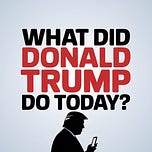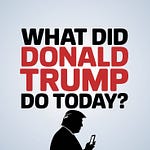Amid growing economic instability and recession fears, President Trump abruptly paused most global tariffs for 90 days while simultaneously hiking Chinese tariffs to 125%, narrowing the broader trade war into a direct U.S.-China confrontation. Markets surged on the news, but the administration's conflicting explanations—ranging from strategic diplomacy to panic over investor anxiety—revealed a reactive, disjointed economic strategy. Canada and Mexico remain excluded from the pause due to fentanyl-related concerns. Trump’s decision, made hastily and announced with little coordination, underscores the unpredictability of his second-term trade policy. While the White House claims this opens space for bespoke trade negotiations, critics point to increasing inflation risks and eroding global trust.
At a chaotic White House briefing tied to the tariff announcement, Trump signed a slew of executive orders combining deregulation, economic nationalism, and personal grievances. He promoted military export reforms but emphasized profit over accountability. His lengthy, theatrical rants on showerhead regulations, consumer appliances, and plastic straws framed policy through grievance rather than substance. More troubling were orders targeting legal professionals and former officials like Chris Krebs and Miles Taylor, accusing them of espionage and lawfare without due process—signaling an authoritarian use of executive power to punish dissent.
Trump’s deregulatory orders further dismantled administrative safeguards. These included “zero-based” regulatory budgeting, mass repeals of rules deemed unlawful, and vague competition mandates. Though framed as innovation-friendly, they effectively weaken consumer protections, burden agencies, and prioritize executive ideology over legal norms. His order on water pressure mocked legal standards and bypassed rulemaking procedures, while his maritime and defense acquisition orders relied on heavy-handed federal coordination and privatization, often contradicting their deregulatory rhetoric. These moves promote a political agenda cloaked in policy language, undermining both governance and regulatory integrity.
Finally, Trump’s effort to remove Democratic appointees from independent agencies—temporarily allowed by Chief Justice Roberts—raises constitutional concerns over executive control of watchdog institutions. Together, these actions reflect a second-term presidency defined by executive overreach, ideological retribution, and destabilization of legal and regulatory norms.













Share this post